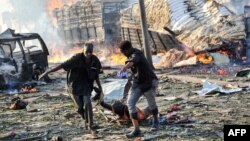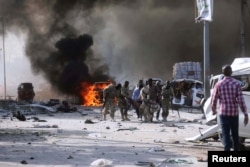The death toll keeps climbing after Saturday's massive truck bombing in Mogadishu. By Monday afternoon, the Somali government put the death count at 276 and wounded at 429. Analysts say the Somali government must be more vigilant against improvised explosive devices if the country is to avoid similar attacks in the future.
It’s being called the single deadliest attack in Somalia’s history; a huge truck bomb that detonated in the middle of a busy Mogadishu intersection on Saturday. Its magnitude stunned a city already well-accustomed to deadly bombings by the al-Qaida-linked terror group al-Shabab.
Somalia’s president Mohamed Abdullahi “Farmajo” accused al-Shabab of the attack, although no one has yet claimed responsibility.
No end in sight
Rashid Abdi, Horn of Africa project director for the International Crisis Group, says the “horrendous loss of life” eclipses anything seen in Somalia in the last two decades.
He says the government needs to take greater precautions against vehicle-borne explosive devices.
“For the next decade, al-Shabab will continue to be a threat," he said. "And I think they will continue to launch these kinds of suicide attacks. So expectations are that as we go forward, Somalia will continue to improve its counter-measures in basically detecting and interdicting these types of VBIEDs.”
Abdi says that the internal security apparatus in the country needs to be strengthened, but notes that the task “cannot be completed in a day.”
Security crisis
He notes the attack happened days after Somalia's defense minister and army chief of staff resigned.
“And there have been consistent reports of friction within the security services themselves. So it is quite plausible that there was a serious lapse of security largely brought about by this crisis. That is quite conceivable,” he said.
Abdirashid Hashi, executive director of the Mogadishu-based Heritage Institute for Policy Studies, believes that something positive needs to come from the situation.
“So I think the government can do better, and the first order of business is to use this anger and this agony to galvanize the Somali people for a common agenda and a common interest,” he said.
The president has declared three days of mourning, announced that flags would be flown at half-mast, and responded to the call for donated blood.
Former al-Shabab commander Mukhtar Robow also donated blood, saying, “those who are behind this, whose fingerprints are on this must refrain from shedding the blood of Muslims and repent. You are not going to go to paradise by killing innocents.”
More than 30 severely wounded patients were airlifted to Turkey Monday, including a VOA freelance reporter.







